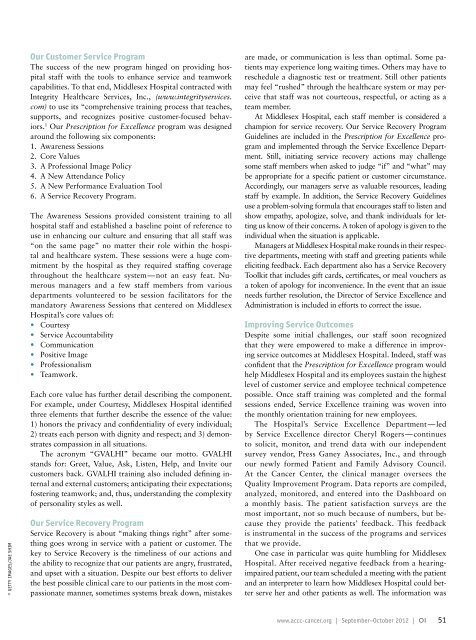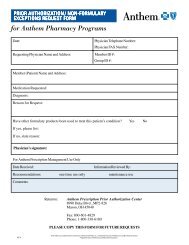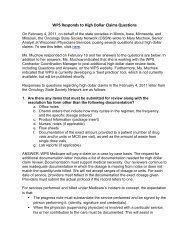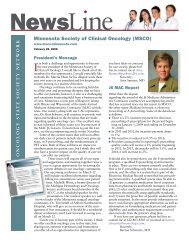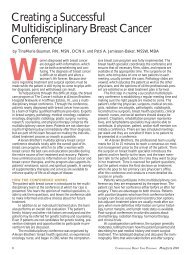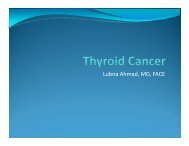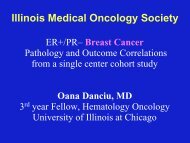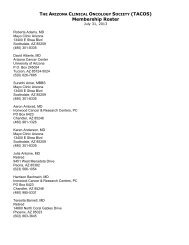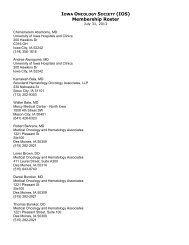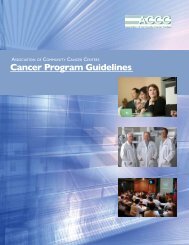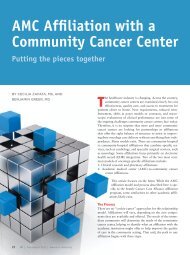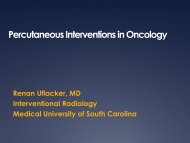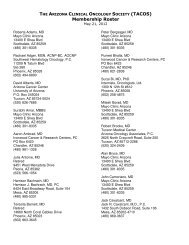Implementing a service excellence program - Association of ...
Implementing a service excellence program - Association of ...
Implementing a service excellence program - Association of ...
- No tags were found...
You also want an ePaper? Increase the reach of your titles
YUMPU automatically turns print PDFs into web optimized ePapers that Google loves.
© Getty Images/Jae ShimOur Customer Service ProgramThe success <strong>of</strong> the new <strong>program</strong> hinged on providing hospitalstaff with the tools to enhance <strong>service</strong> and teamworkcapabilities. To that end, Middlesex Hospital contracted withIntegrity Healthcare Services, Inc., (www.integrity<strong>service</strong>s.com) to use its “comprehensive training process that teaches,supports, and recognizes positive customer-focused behaviors.1 Our Prescription for Excellence <strong>program</strong> was designedaround the following six components:1. Awareness Sessions2. Core Values3. A Pr<strong>of</strong>essional Image Policy4. A New Attendance Policy5. A New Performance Evaluation Tool6. A Service Recovery Program.The Awareness Sessions provided consistent training to allhospital staff and established a baseline point <strong>of</strong> reference touse in enhancing our culture and ensuring that all staff was“on the same page” no matter their role within the hospitaland healthcare system. These sessions were a huge commitmentby the hospital as they required staffing coveragethroughout the healthcare system—not an easy feat. Numerousmanagers and a few staff members from variousdepartments volunteered to be session facilitators for themandatory Awareness Sessions that centered on MiddlesexHospital’s core values <strong>of</strong>:• Courtesy• Service Accountability• Communication• Positive Image• Pr<strong>of</strong>essionalism• Teamwork.Each core value has further detail describing the component.For example, under Courtesy, Middlesex Hospital identifiedthree elements that further describe the essence <strong>of</strong> the value:1) honors the privacy and confidentiality <strong>of</strong> every individual;2) treats each person with dignity and respect; and 3) demonstratescompassion in all situations.The acronym “GVALHI” became our motto. GVALHIstands for: Greet, Value, Ask, Listen, Help, and Invite ourcustomers back. GVALHI training also included defining internaland external customers; anticipating their expectations;fostering teamwork; and, thus, understanding the complexity<strong>of</strong> personality styles as well.Our Service Recovery ProgramService Recovery is about “making things right” after somethinggoes wrong in <strong>service</strong> with a patient or customer. Thekey to Service Recovery is the timeliness <strong>of</strong> our actions andthe ability to recognize that our patients are angry, frustrated,and upset with a situation. Despite our best efforts to deliverthe best possible clinical care to our patients in the most compassionatemanner, sometimes systems break down, mistakesare made, or communication is less than optimal. Some patientsmay experience long waiting times. Others may have toreschedule a diagnostic test or treatment. Still other patientsmay feel “rushed” through the healthcare system or may perceivethat staff was not courteous, respectful, or acting as ateam member.At Middlesex Hospital, each staff member is considered achampion for <strong>service</strong> recovery. Our Service Recovery ProgramGuidelines are included in the Prescription for Excellence <strong>program</strong>and implemented through the Service Excellence Department.Still, initiating <strong>service</strong> recovery actions may challengesome staff members when asked to judge “if” and “what” maybe appropriate for a specific patient or customer circumstance.Accordingly, our managers serve as valuable resources, leadingstaff by example. In addition, the Service Recovery Guidelinesuse a problem-solving formula that encourages staff to listen andshow empathy, apologize, solve, and thank individuals for lettingus know <strong>of</strong> their concerns. A token <strong>of</strong> apology is given to theindividual when the situation is applicable.Managers at Middlesex Hospital make rounds in their respectivedepartments, meeting with staff and greeting patients whileeliciting feedback. Each department also has a Service RecoveryToolkit that includes gift cards, certificates, or meal vouchers asa token <strong>of</strong> apology for inconvenience. In the event that an issueneeds further resolution, the Director <strong>of</strong> Service Excellence andAdministration is included in efforts to correct the issue.Improving Service OutcomesDespite some initial challenges, our staff soon recognizedthat they were empowered to make a difference in improving<strong>service</strong> outcomes at Middlesex Hospital. Indeed, staff wasconfident that the Prescription for Excellence <strong>program</strong> wouldhelp Middlesex Hospital and its employees sustain the highestlevel <strong>of</strong> customer <strong>service</strong> and employee technical competencepossible. Once staff training was completed and the formalsessions ended, Service Excellence training was woven intothe monthly orientation training for new employees.The Hospital’s Service Excellence Department—ledby Service Excellence director Cheryl Rogers—continuesto solicit, monitor, and trend data with our independentsurvey vendor, Press Ganey Associates, Inc., and throughour newly formed Patient and Family Advisory Council.At the Cancer Center, the clinical manager oversees theQuality Improvement Program. Data reports are compiled,analyzed, monitored, and entered into the Dashboard ona monthly basis. The patient satisfaction surveys are themost important, not so much because <strong>of</strong> numbers, but becausethey provide the patients’ feedback. This feedbackis instrumental in the success <strong>of</strong> the <strong>program</strong>s and <strong>service</strong>sthat we provide.One case in particular was quite humbling for MiddlesexHospital. After received negative feedback from a hearingimpairedpatient, our team scheduled a meeting with the patientand an interpreter to learn how Middlesex Hospital could betterserve her and other patients as well. The information waswww.accc-cancer.org | September–October 2012 | OI 51


